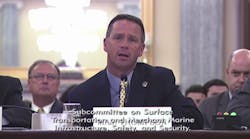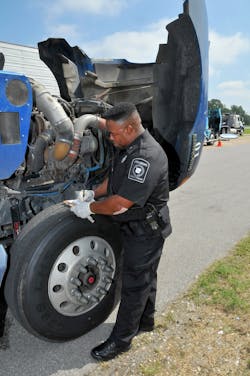The new highway bill has many positives and some notable negatives for state trucking regulatory enforcement agencies, an agency representative told the Senate Commerce committee Tuesday, but all of the congressionally mandated changes, for better or worse, will require time to fully implement.
Still, Major Jay Thompson of the Arkansas Highway Police, current president of the Commercial Vehicle Safety Alliance (CVSA), said the FAST Act provisions addressed many enforcement concerns, and the changes will “dramatically improve” commercial vehicle safety. He testified before the Subcommittee on Surface Transportation and Merchant Marine Infrastructure, Safety, and Security in a hearing on the implementation of the highway funding legislation and its impact.
Thompson opened by commending the Federal Motor Carrier Safety Administration for their “swift response” in handling the numerous directives in the highway bill. Specifically, he highlighted the reorganization of the Motor Carrier Safety Assistance Program (MCSAP), aimed at simplifying the way the FMCSA allocates enforcement funds to the states.
“Because the changes are so significant and impact every facet of the program, it is imperative that CVSA, the states, and FMCSA work together to identify potential issues and the best working solutions for all parties,” Thompson said. “In addition, the petition and guidance reform will help improve the clarity of the safety regulations, ensuring that those subject to regulations understand their responsibilities and that those tasked with enforcing them can do so effectively and uniformly.”
Thompson also pointed to the “hardcoding and smart logic” component of the FMCSA reforms as one that should be implemented “as quickly as possible.”
“It is imperative that the roadside inspection and enforcement data be as uniform and accurate as possible,” he said. “While the vast majority of the roadside inspection data collected is sound, implementing the hardcoding and smart logic requirements will help eliminate errors and further ensure uniformity in the roadside inspection and enforcement data collection process.”
The state enforcement agencies have a problem, however, with the “many exemptions” from trucking regulations granted in the highway bill.
“While CVSA may not have a specific opposition to the exemptions on an individual basis, complications have already surfaced regarding their implementation,” Thompson said. “Putting the exemptions into place takes time.”
He noted that FMCSA has to develop guidance on the exemptions, and the states must then go through their respective processes for adoption and implementation. And in some states, that requires legislation—but some state legislatures only convene every two years.
Therefore, enforcement generally discourages the inclusion of exemptions in legislation, Thompson testified. CVSA believes that exemptions have the potential to undermine safety, while also complicating the enforcement process.
“Making an exemption effective immediately, from a practical standpoint, simply is not possible,” Thompson testified. “[The exemption process] only serves to unnecessarily create tension between enforcement and industry. We understand exemptions are intended to provide relief, and that the industry understandably wants that relief as soon as possible. But if the exemption cannot be enforced correctly and consistently, industry and enforcement both suffer.”
In responding to questions from the committee, Thompson noted that most accidents are the result of driver error—and are largely not the fault of the truck driver—and he emphasized the need for increased traffic enforcement and education aimed at non-commercial vehicles, particularly with regard to distracted driving.
“But we cannot lose focus on the vehicle inspection component,” Thompson said. “There are still commercial motor vehicles out there, travelling our nation’s highways, that do have faulty equipment and equipment violations.”
Thompson’s prepared statement, including additional detail on CVSA’s positions, is here.




